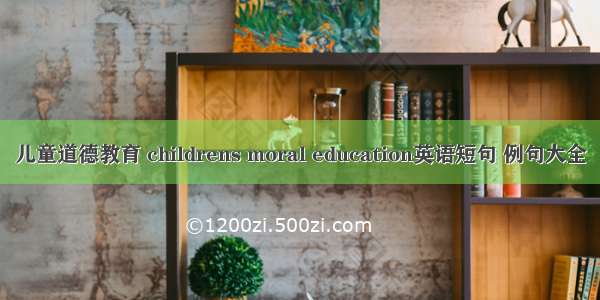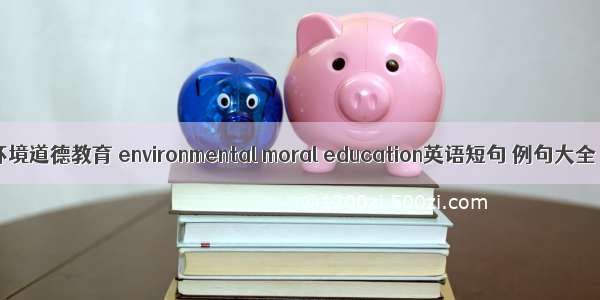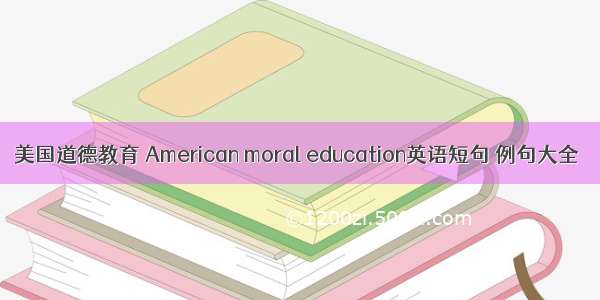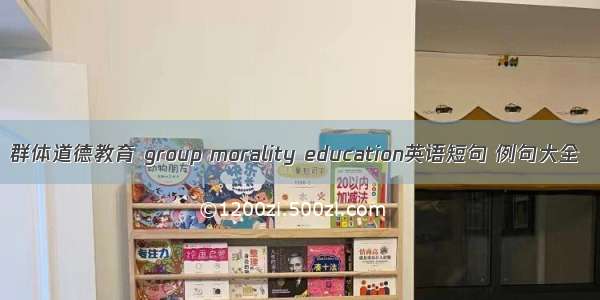
儿童道德教育,children"s moral education
1)children"s moral education儿童道德教育
英文短句/例句
1.Individual Moral Narration : New Model in Children Moral Education;个体道德叙事:儿童道德教育的可能方式
2.On the Problem and the Way out of Children Literature in Children Moral Education During the Era of Multi-media;多媒体时代儿童文学在儿童道德教育中面临的问题和出路
3.Stressing the Games and Valuing Children’s Nature--On the Thinking of the Moral Education of Children;重视游戏 尊重儿童的天性——关于儿童道德教育方式的思考
4.Post-modernization Knowledge View and the Reformation in Preschool Children Moral Education;后现代知识观与学前儿童道德教育改革
5.Noddings Care Theory and its Enlightenment on Children s Moral-oriented Education;诺丁斯的关心理论及其对儿童道德教育的启示
6.Study on Development of Preschoolers" Moral Cognition under Fairy Tales Education童话道德教育方式下幼儿道德认知发展研究
7.Children 1 family education 1 education morality mixes 1 cheeper moral character is two ideas that having close connection.儿童1家教1幼儿1教育道德和品德是有着紧密联系的两个概念。
8.Enlightenment Education of Moralities Should Follow the Physical and Mental Development Patterns of Children;进行道德启蒙教育要遵循儿童身心发展规律
9.Children"s Moral "Deep Grammar" and "Moral Education"儿童道德的“深层语法”与“道德教化”
10.Train up a child in the way he should go.教育儿童,使他走正道。
11.The Education of "Love" and "Justice"--A New Starting Point of Children Moral Education;“爱”与“公正”教育——儿童德育的“新起点”
12.On the Moral Education s Significances of the Reading Classics for Children;论少年儿童读经教育的德育意义——加强未成年人道德教育的有益探索
13.The study of gender difference in the moral development in physical education;儿童体育道德发展过程中的性别差异
14.School helps to form a child"s character.学校教育有助于培养儿童的品德。
parative Study of Children s Modern Family Music Teaching between Chinese and German;当代中德儿童家庭音乐教育比较研究
16.The Research of Herbert·Read s Thought of Children s Fine Art Education;赫伯·里德的儿童美术教育思想研究
17.Critical Reflection on Moral Narrative in Current Children s Moral Education;对当前儿童德育中道德叙事的批判和反思
18.Societies are morally obligated to work towards the eventual abolition of child labor and to provide basic education for children who must work for the sustenance of their families.社会有道德、有责任最终废除童工,并为必须工作养家的儿童提供最基本的教育。
相关短句/例句
children moral education儿童道德教育
1.Nowadays, there re many irrational phenomena inchildren moral education.儿童道德教育是个体道德成长的基石。
2.Children moral education is that the educator exposes some influence on the educated through the moral rules and behavioral norms which are consistent with the social demand, therefore making the Social standard demand become a good moral and action of the educated.儿童道德教育是教育者用符合社会要求的思想道德规范和行为规范对儿童施加一定程度的影响,从而将其内化为儿童良好道德行为习惯的一种社会实践活动。
3)The Moral Instruction of Children儿童的道德教育
4)On the Moral Education of Children儿童道德教育浅谈
5)children morality儿童道德
1.Children literature has extremely important significance in structuringchildren morality system.儿童文学对于构建儿童道德系统有着极其重要的意义,但是多媒体时代的来临使得儿童文学面临作品成人化趋势严重,创作队伍和读者群的流失,儿童文学遭遇电子媒体的挤压,中小学校语文教师在儿童文学教学方面准备不足等问题。
6)Children education儿童教育
1.Understanding,Guiding and Liberating Children——On Children Education Ideology of Lu Xun and its Enlightenment at Present;理解儿童,指导儿童,解放儿童——论鲁迅儿童教育思想及其当今启示
2.Modern explanations for Lu Xun’s children education outlook鲁迅儿童教育观的现代解读
3.Kang Keqing was an exploiter of the cause of Chinese children education who had rich and profound children educational thoughts.康克清是我国儿童保育工作的开拓者,为我国儿童教育事业做出了重大贡献。
延伸阅读
皮亚杰儿童道德认知发展阶段论皮亚杰儿童道德认知发展阶段论Piaget"s moral-cognitive developmental stage theory of children皮亚杰儿童道德认知发展阶段论(P iag-et,5 mora]一eognitive develoPmental stagetheory of children)皮亚杰主要从认知发展的过程和结构来研究儿童品德的发展。他认为,认知发展是品德发展的必要条件,儿童品德的发展依赖于儿童思维的发展他在大量的临床研究的基础仁,把儿童品德发展划分为四个阶段:(l)自我中心阶段(约2一5岁)。是从儿童能够接受外界的准则开始的。皮亚杰在观察儿童打弹子游戏时发现,儿童对待游戏规则的态度中有一个矛盾现象,儿童虽然在模仿游戏规则,但他们总是自己玩着自己的游戏,不顾规则的规定,按照自己的想像去执行规则。皮亚杰认为,这是由于这一时期的儿童跟成人或同伴间还没有相互合作的关系,还不能把自己与外界区别开来,把外界看做是自身的延伸,按照自己的想像去理解外界事物。所以,规则对他来说,还不具有约束力,还不能把规则当做一种有义务去遵守的东西。皮亚杰把这种二重性,定名为“自我中心主义”(2)权威阶段(约6一8岁)。皮亚杰认为,这一阶段儿童的道德生活几乎完全以服从外在权威为特征。他们绝对遵从年龄较大的、更成熟的或者被认为居于权威地位的人。每个儿童都是按照违犯还是遵从权威的规定去判断是非的,服从、听话就是好的,不服从、不听话就是坏的。他们还把人们为了一定目的而规定的准则,看成与固定的、不一盯改变的自然法则是一样的,把因违犯道德准则而受罚跟因违反自然法则而遭殃混淆起来。这种以服从自然力量为特征的道德判断模式,本质上也是服从权威的一种形式。(3)相互对等阶段(约8一10岁)。这一阶段的儿童己不把准则看成是固定的、不可改变的,而看做是同伴间为了保证共同利益而共同约定的。他们的道德判断不再以单方面的服从权威为特征,而是以相互尊重共同约定的准则为特征。皮亚杰认为,同伴间的相互尊重不可避免地会产生社会平等。儿童本来认为好坏的标准取决于服从或不服从,而现在则产生了一个新的标准,那就是公平或不公平。同伴间对等关系的出现是自律的道德品质萌芽的标志。(4)公道阶段(约11一12岁)。这一阶段是从对等的道德观念脱胎而来的。皮亚杰认为,从同伴间的对等关系转变到公道阶段,利他主义是个关键因素。当对等的道德观念从利他主义角度考虑时,就会产生公道的观念,它反映了一种关心与同情人的道德关系。皮亚杰的上述关于品德发展的阶段是一个连续的统一体,其中贯穿着四个基本观点,即:(l)从单纯的规则到具有真正意义的准则。(2)从单方面的尊重到多方面的尊重。(3)从约束的道德品质到合作的道德品质。(4)从他律到自律。(戚立夫撰匪亘国审)














